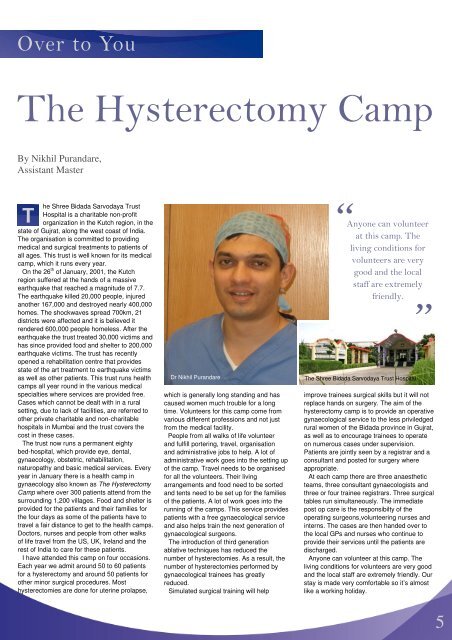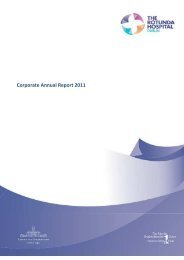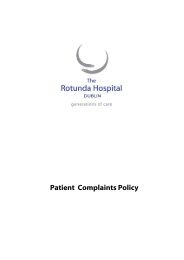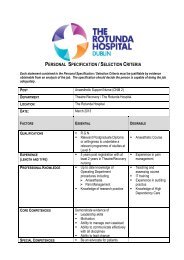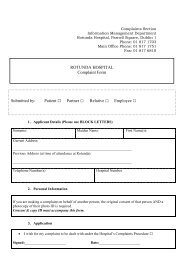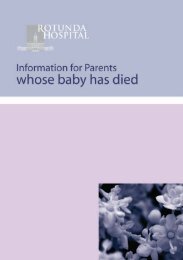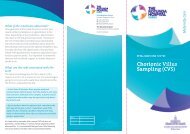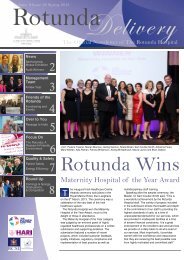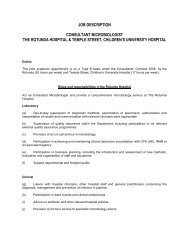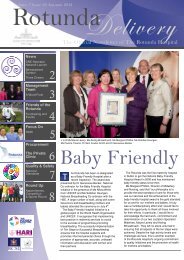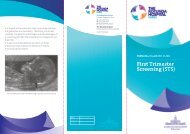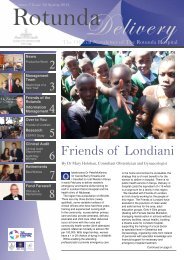RD Vol 8 issue 27 Summer 2013 - Rotunda Hospital
RD Vol 8 issue 27 Summer 2013 - Rotunda Hospital
RD Vol 8 issue 27 Summer 2013 - Rotunda Hospital
Create successful ePaper yourself
Turn your PDF publications into a flip-book with our unique Google optimized e-Paper software.
Over to YouThe Hysterectomy CampBy Nikhil Purandare,Assistant MasterThe Shree Bidada Sarvodaya Trust<strong>Hospital</strong> is a charitable non-profitorganization in the Kutch region, in thestate of Gujrat, along the west coast of India.The organisation is committed to providingmedical and surgical treatments to patients ofall ages. This trust is well known for its medicalcamp, which it runs every year.On the 26 th of January, 2001, the Kutchregion suffered at the hands of a massiveearthquake that reached a magnitude of 7.7.The earthquake killed 20,000 people, injuredanother 167,000 and destroyed nearly 400,000homes. The shockwaves spread 700km, 21districts were affected and it is believed itrendered 600,000 people homeless. After theearthquake the trust treated 30,000 victims andhas since provided food and shelter to 200,000earthquake victims. The trust has recentlyopened a rehabilitation centre that providesstate of the art treatment to earthquake victimsas well as other patients. This trust runs healthcamps all year round in the various medicalspecialties where services are provided free.Cases which cannot be dealt with in a ruralsetting, due to lack of facilities, are referred toother private charitable and non-charitablehospitals in Mumbai and the trust covers thecost in these cases.The trust now runs a permanent eightybed-hospital, which provide eye, dental,gynaecology, obstetric, rehabilitation,naturopathy and basic medical services. Everyyear in January there is a health camp ingynaecology also known as The HysterectomyCamp where over 300 patients attend from thesurrounding 1,200 villages. Food and shelter isprovided for the patients and their families forthe four days as some of the patients have totravel a fair distance to get to the health camps.Doctors, nurses and people from other walksof life travel from the US, UK, Ireland and therest of India to care for these patients.I have attended this camp on four occasions.Each year we admit around 50 to 60 patientsfor a hysterectomy and around 50 patients forother minor surgical procedures. Mosthysterectomies are done for uterine prolapse,Dr Nikhil Purandarewhich is generally long standing and hascaused women much trouble for a longtime. <strong>Vol</strong>unteers for this camp come fromvarious different professions and not justfrom the medical facility.People from all walks of life volunteerand fulfill portering, travel, organisationand administrative jobs to help. A lot ofadministrative work goes into the setting upof the camp. Travel needs to be organisedfor all the volunteers. Their livingarrangements and food need to be sortedand tents need to be set up for the familiesof the patients. A lot of work goes into therunning of the camps. This service providespatients with a free gynaecological serviceand also helps train the next generation ofgynaecological surgeons.The introduction of third generationablative techniques has reduced thenumber of hysterectomies. As a result, thenumber of hysterectomies performed bygynaecological trainees has greatlyreduced.Simulated surgical training will help“Anyone can volunteerat this camp. Theliving conditions forvolunteers are verygood and the localstaff are extremelyfriendly.”The Shree Bidada Sarvodaya Trust <strong>Hospital</strong>improve trainees surgical skills but it will notreplace hands on surgery. The aim of thehysterectomy camp is to provide an operativegynaecological service to the less priviledgedrural women of the Bidada province in Gujrat,as well as to encourage trainees to operateon numerous cases under supervision.Patients are jointly seen by a registrar and aconsultant and posted for surgery whereappropriate.At each camp there are three anaestheticteams, three consultant gynaecologists andthree or four trainee registrars. Three surgicaltables run simultaneously. The immediatepost op care is the responsibilty of theoperating surgeons,volunteering nurses andinterns. The cases are then handed over tothe local GPs and nurses who continue toprovide their services until the patients aredischarged.Anyone can volunteer at this camp. Theliving conditions for volunteers are very goodand the local staff are extremely friendly. Ourstay is made very comfortable so it’s almostlike a working holiday.5


